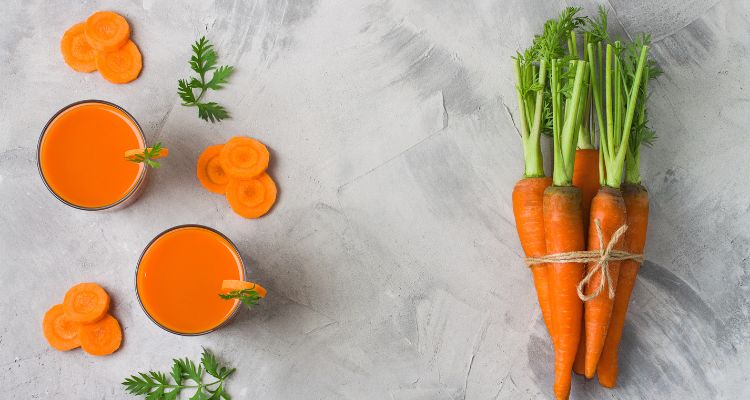Juice cleanses are a popular method for detoxifying the body and kickstarting a healthier lifestyle. However, many people wonder, “Can I eat on a juice cleanse?” This comprehensive guide will provide you with all the information you need to understand what you can and cannot eat during a juice cleanse and how to make the most of this detoxifying experience.
What is a Juice Cleanse?
A juice cleanse, also known as a juice fast or detox diet, involves consuming only fruit and vegetable juices for a specific period, usually ranging from one to ten days. The primary goal of a juice cleanse is to give your digestive system a break by eliminating solid foods and allowing your body to absorb nutrients more efficiently.
The Purpose of a Juice Cleanse
The main objectives of a juice cleanse are to:
- Detoxify the body: Juice cleanses aim to flush out toxins that have accumulated in the body over time, promoting better overall health and well-being.
- Boost the immune system: By providing an abundance of vitamins and minerals found in fruits and vegetables, juice cleanses can help strengthen the immune system.
- Kickstart weight loss: As juice cleanses are low in calories, they can serve as a starting point for a weight loss journey, though any lost weight may be regained once a regular diet is resumed.
- Improve digestion: Juice cleanses can help alleviate digestive issues by giving the digestive system a break from processing solid foods.
Can I Eat on a Juice Cleanse?
The short answer is yes; you can eat on a juice cleanse, but with some limitations. While the primary focus of a juice cleanse is to consume liquids in the form of fruit and vegetable juices, certain solid foods can be incorporated into your cleanse. However, it’s essential to choose the right foods that will support your detoxification efforts and maintain the cleanse’s effectiveness.
What Can You Eat on a Juice Cleanse?
If you feel the need to eat during your juice cleanse, here are some options that you can consider:
- Raw fruits and vegetables: Consuming raw fruits and vegetables can help maintain your body’s nutrient levels while still adhering to the principles of a juice cleanse. Opt for low-calorie, high-fiber options like leafy greens, cucumbers, celery, and berries.
- Nuts and seeds: Nuts and seeds are high in healthy fats, protein, and fiber, which can help keep you satiated during your cleanse. Choose raw, unsalted varieties like almonds, walnuts, chia seeds, and flaxseeds.
- Avocado: Avocado is a great source of healthy fats and can help you feel fuller for longer. It also contains essential nutrients like potassium, magnesium, and vitamins B, C, and E.
- Coconut water: Coconut water is a natural electrolyte-rich beverage that can help keep you hydrated and energized during your juice cleanse.
Foods to Avoid During a Juice Cleanse
When following a juice cleanse, you should avoid the following foods:
- Processed and refined foods: These include fast food, fried foods, sugary snacks, and pre-packaged meals.
- Caffeine: Caffeine can interfere with the detoxification process, so it’s best to avoid coffee, tea, and energy drinks during your cleanse.
- Alcohol: Alcohol can hinder the liver’s ability to detoxify your body, so it’s essential to avoid it during your cleanse.
- Animal products: Meat, dairy, and eggs can be difficult for your body to digest and should be avoided on a juice cleanse.
How to Plan Your Juice Cleanse
Before starting a juice cleanse, it’s crucial to prepare your body and environment for the detoxification process. Here are some steps you can take to ensure a successful cleanse:
- Consult a healthcare professional: Speak with your doctor or a registered dietitian before embarking on a juice cleanse, especially if you have any underlying health conditions or concerns.
- Gradually eliminate trigger foods: In the days leading up to your cleanse, start eliminating common trigger foods from your diet, such as caffeine, sugar, alcohol, and processed foods. This will help reduce withdrawal symptoms during the cleanse.
- Choose organic produce: When possible, opt for organic fruits and vegetables to minimize your exposure to pesticides and other harmful chemicals.
- Stay hydrated: Drink plenty of water throughout your cleanse to help flush toxins from your system and prevent dehydration.
Juice Cleanse Recipes and Ideas
To make the most of your juice cleanse, experiment with a variety of fruit and vegetable combinations to keep things interesting. Here are some ideas to get you started:
- Green Juice: Combine kale, spinach, cucumber, celery, green apple, and lemon for a nutrient-rich green juice.
- Detox Juice: Mix beet, carrot, ginger, and lemon for a detoxifying juice loaded with antioxidants.
- Immune-Boosting Juice: Blend orange, grapefruit, strawberries, and kiwi for a vitamin C-packed juice that can help support your immune system.
- Hydration Booster: Combine watermelon, cucumber, and mint for a refreshing juice that will help keep you hydrated.
Post-Juice Cleanse Transition
After completing your juice cleanse, it’s essential to gradually reintroduce solid foods back into your diet. Here’s a suggested timeline for easing back into regular eating:
- Day 1: Start with raw or lightly steamed vegetables, fruits, and nuts in small portions.
- Day 2: Incorporate plant-based foods such as beans, legumes, and whole grains like quinoa and brown rice.
- Day 3: Slowly add animal products, including dairy, eggs, and lean meats, if desired.
- Day 4 and beyond: Resume eating a healthy, balanced diet and maintain good habits learned during the cleanse.
Pros and Cons of a Juice Cleanse
Before starting a juice cleanse, it’s essential to consider the potential benefits and drawbacks.
Pros
- Improved health: Consuming nutrient-rich fruits and vegetables can support immunity and overall health.
- Increased energy: Many people report feeling more energetic during a juice cleanse due to the elimination of energy-zapping foods and increased hydration.
- Toxin elimination: Some fruits and vegetables are natural detoxifiers and can help flush toxins from the body.
Cons
- Promotes unhealthy eating habits: Juice cleanses can lead to temporary weight loss but may also encourage weight gain once a regular diet is resumed, promoting unhealthy eating habits.
- May cause health risks: Juice cleanses can pose health risks, such as kidney stones, low blood sugar, and bacterial infections, especially if not executed properly.
Conclusion
In conclusion, while you can eat on a juice cleanse, it’s essential to choose the right foods and maintain the effectiveness of the detoxification process. A juice cleanse can provide numerous benefits, but it’s crucial to approach it with caution and consult a healthcare professional before beginning. By following the guidelines outlined in this guide, you can ensure a successful juice cleanse experience and take a step toward a healthier lifestyle.

